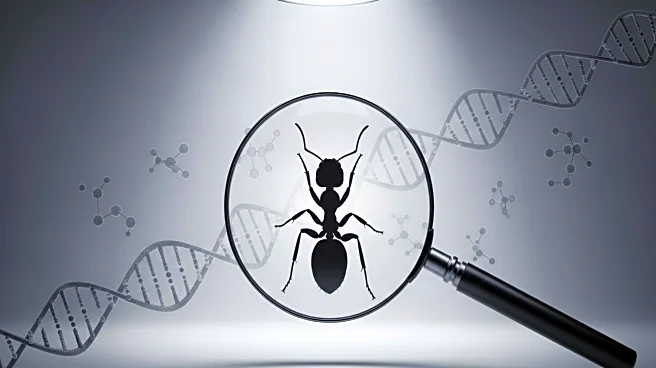What's Happening?
Researchers at Rockefeller University have uncovered a genetic mechanism that allows ants to maintain their highly precise sense of smell. This discovery, published in Current Biology, reveals that ants use a genetic safeguard to silence surrounding receptor genes, ensuring that each neuron expresses only one odorant receptor. This mechanism prevents the scrambling of sensory signals, which is crucial for ants' chemical communication. The study focused on the clonal raider ant and utilized advanced molecular and computational techniques to identify how ants achieve this specificity. The findings suggest that ants employ a unique form of gene regulation, different from other species like fruit flies and mammals, to maintain their olfactory precision.
Why It's Important?
The discovery of this genetic mechanism has significant implications for understanding sensory biology and evolution. By revealing how ants maintain a 1:1 ratio between receptors and neurons, the research provides insights into the rapid evolution of olfactory abilities in ants. This mechanism could be widespread among insects, suggesting a common evolutionary strategy for managing large gene families. The findings also offer a potential blueprint for how genomes can regulate complex gene clusters, which could have broader applications in biotechnology and genetic engineering. Understanding these processes could lead to advancements in developing new sensory technologies or improving pest control strategies.
What's Next?
The research team plans to explore whether this genetic mechanism is present in other insect species, both social and non-social. Further studies could confirm the broader distribution of this gene regulation strategy and its evolutionary advantages. Additionally, the insights gained from this research may inspire new approaches in genetic engineering, particularly in designing systems that require precise gene expression control. The potential applications in biotechnology and agriculture could lead to innovative solutions for managing insect populations or enhancing crop resilience.
Beyond the Headlines
This discovery highlights the importance of studying non-traditional model organisms, as they can reveal fundamental biological processes not observable in more commonly studied species. The research underscores the complexity of genetic regulation and its role in evolutionary adaptation. It also raises ethical considerations about the manipulation of genetic systems in insects, particularly in the context of pest control and environmental impact. As scientists continue to unravel these genetic mechanisms, they must balance the potential benefits with ecological and ethical implications.









